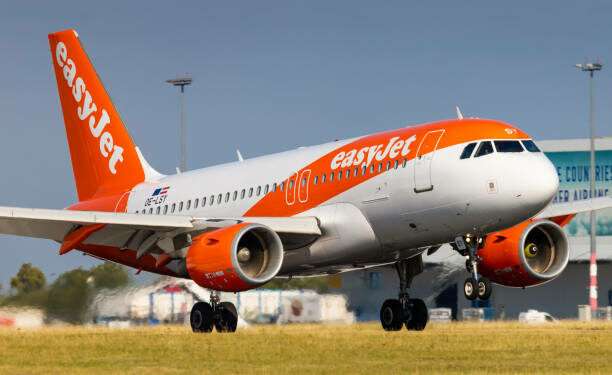
EasyJet reports ‘record summer bounceback’ as annual losses are cut
The in-house tour operation contributed incremental revenue of £368 million against £34 million in 2021 from 1.1 million customers, delivering £38 million of headline profit before tax compared with a loss of £12 million in the previous 12 months.
EasyJet cut losses in the year to September 30 with a “record summer bounceback” despite incurring flight disruption costs of £78 million.
The UK budget carrier reported a pre-tax loss of £178 million, down from more than £1.1 billion in the previous 12 months.
EasyJet holidays “performed strongly” with this summer being its first season of trading relatively unaffected by Covid-19 under its revised operating model.
The in-house tour operation contributed incremental revenue of £368 million against £34 million in 2021 from 1.1 million customers, delivering £38 million of headline profit before tax compared with a loss of £12 million in the previous 12 months.
The group’s improved performance camei despite what the airline described as “multiple headwinds” throughout the 2022 financial year
These were detailed as the Omicron variant of Covid-19, the impact of Russia’s invasion of Ukraine and operational challenges as demand “returned at scale” following the widespread removal of travel restrictions across Europe. Incremental disruption costs of £78 million were incurred.
Easyjet passenger carryings rose by 242% to almost 70 million with revenue up from £1.4 billion to more than £5.7 billion.
The recovery “was driven by increased capacity and yields as customer confidence to travel returned once Covid-19 related restrictions were lifted across Europe, along with enhanced contribution from our ancillary product offering and easyJet holidays,” the airline said.
However, capacity for the year was at 78% of pre-pandemic 2019 levels.
EasyJet is continuing to allocate aircraft to the markets where demand is strongest enabled by slot growth at primary airports such Gatwick, Porto, Lisbon and the Greek islands.
Looking forward, the carrier said: “For winter, which is typically a loss-making period, easyJet is investing in building additional resilience.
“This investment allows for summer ’23 preparations to start earlier in response to the tight labour market, where we have already begun our seasonal recruitment campaign.
“Alongside this, we now have a dedicated team in place to process employment reference checks as efficiently as possible. EasyJet, like all airlines, is seeing cost pressures including fuel, strengthened US dollar and wage inflation.
“Peak holiday weeks this winter, such as October half term and Christmas week in the UK, are back to normal levels of volume. Through these key periods, ticket yields are showing strength on the prior year, with the Christmas period’s ticket yield currently up 18%.
“Visibility over bookings in the second half remains low, however Easter booked ticket yields are strong and booked load factors for Easter are ahead of the prior year.”
The carrier insisted it was going into the 2023 financial year “with one of the strongest balance sheets in European aviation”.
EasyJet added: “This financial strength, combined with our leading low-cost proposition at primary airports provides a key differentiator for customers, making it easy for customers to switch towards value.
“EasyJet’s historic performance in a challenging economic environment where the consumer was squeezed has been strong, as evidenced in 2008/09 during the global financial crisis when easyJet delivered increased margins as well as capacity growth.”
Chief executive Johan Lundgren said: “EasyJet has achieved a record bounce back this summer with a performance which underlines that our transformation is delivering.
“The summer saw easyJet achieve its highest ever earnings for a single quarter with headline ebitdar [earnings] of £674 million, ancillaries up by 59% on full year 2019 and easyJet holidays well on its way to its £100 million target.
“EasyJet does well in tough times. Legacy carriers will struggle in this high-cost environment. Consumers will protect their holidays but look for value and across its primary airport network, easyJet will be the beneficiary as customers vote with their wallets.
“Over the next year, we are targeting customer growth and are well placed to drive returns and margins while maintaining a rigorous focus on cost. With one of the strongest balance sheets in European aviation, we are ready to take opportunities as they present themselves.
“We have a clear strategy to drive returns for our shareholders and have significant confidence in our plan today and that it will deliver going forward.”
Source: norvan reports

